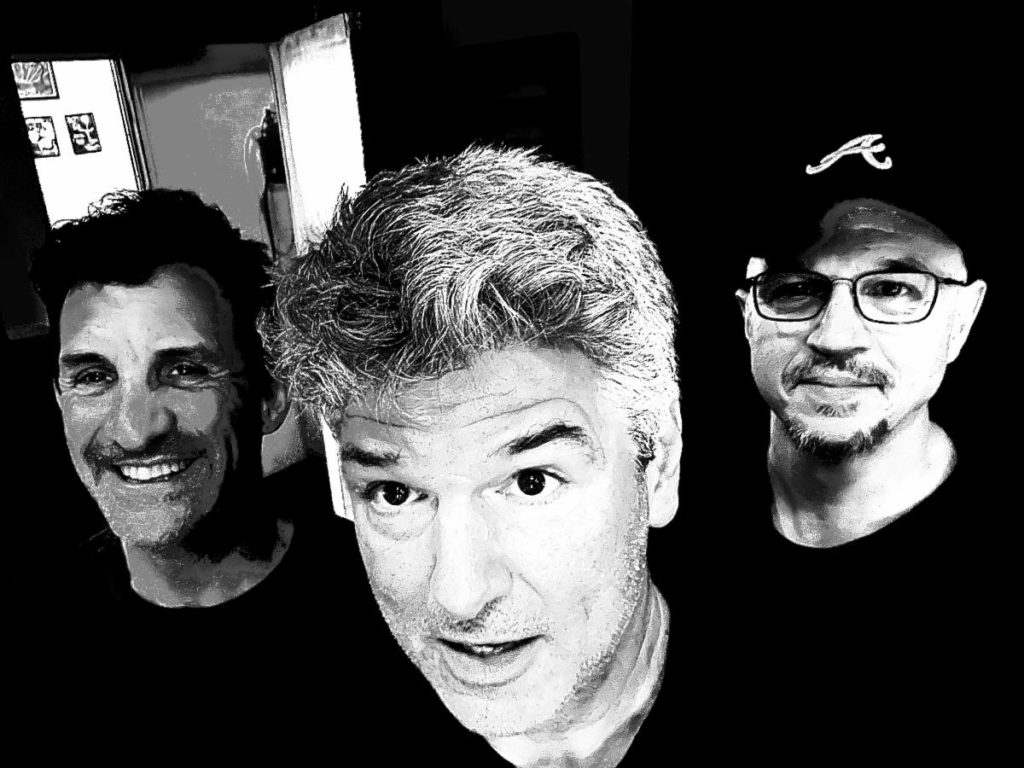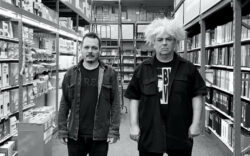Myths and legends are often rooted in truth, or at least in some version of it. When Chase Park Transduction co-owner, producer and engineer David Barbe fields questions about why his heavily mythologized, mid-to-late-’80s post-punk trio Mercyland’s music has remained unavailable for decades, he doesn’t miss a beat when explaining why.
“For so long, I’ve heard these fuzzy, gold-tinged memories from people about Mercyland that the legend became too good,” Barbe offers. “When I was a kid, I remember my grandfather telling me tall tales about growing up in lumberjack camps in Wisconsin during the early 1900s. Hell, I don’t know if any of that’s true. But when something is only available anecdotally, it becomes larger than life.
“It’s like Pecos Bill lassoing onto a twister and disappearing into the sky,” he adds. “I loved Mercyland, so sure, we can be someone’s Pecos Bill.”
All of this will change, however, on Friday, Sept. 16, when Propeller Sound Recordings releases We Never Lost a Single Game, Mercyland’s long-lost second and final proper album, recorded in 1990. The album’s arrival marks the first step in a campaign to preserve and to breathe new life into Mercyland’s music, presenting it the way it was meant to be heard—in reverse chronological order.
We Never Lost a Single Game was recorded toward the end of Mercyland’s initial five-year run, beginning in 1985. Singer and bass player Barbe, along with the group’s original drummer Harry Joiner and guitarist Mark Craig, were filling up clubs right out of the gate. For their third show, they shared the stage with the Red Hot Chili Peppers at UGA.
Over the years, the band went through a turnover, with Barbe later enlisting drummer Joel Suttles and guitarist Andrew Donaldson. By 1990, the group existed in its own, self-made lane. After coming close but never consummating a label deal, they realized that Mercyland was in a perpetual near-miss state. Barbe and his wife had their first child, life was moving on, and it was time for the band to break up.
For six months, Mercyland continued playing shows, but doing only what they truly wanted to do: playing in New York clubs, shows at the beach or anywhere else that was fun and well attended, and college shows where they were well paid. No more beating their heads against the wall, routing tour dates and trying to build an audience by playing weeknights in smaller towns along the way to bigger places.
“There’s a great line in the Minutemen’s ‘Political Song for Michael Jackson to Sing,’” Barbe says. “‘If we heard mortar shells, we’d cuss more in our songs, and cut down on guitar solos.’”
The message being, if the world’s coming to an end, we’re letting loose. That’s the spirit lying at the heart of We Never Lost A Single Game. “We’re just letting it all loose,” Barbe says.
Along the way, the group further honed their melodic Southern hardcore and alternative rock songwriting, evoking hints of anything from Mission of Burma and the Buzzcocks to Minutemen and Hüsker Dü.
If songs such as “Guessing Time Is Gone,” “Big Wind From E. Jesus” and “White Cross” from No Feet on the Cowling wound the meter tight on Mercyland’s fun and fast-paced energy, We Never Lost a Single Game simply and powerfully delivers a deluge of songs made sharp by Barbe’s infectious voice and fast-paced rhythms.
In 1991, four songs—“Minutes And Parts,” “Tough Ass Knives,” “John D. White” and “Freight Truck”—appeared on the Enter The Crafty Bear 7-inch (Planned Obsolescence). In ‘94, all of Mercyland’s songs were bundled together for the Spillage compilation CD (Rykodisc), after Barbe joined ranks with drummer Malcolm Travis and ex-Hüsker Dü singer and guitarist Bob Mould in the group Sugar.
Here, the album’s nine songs are stripped of their original stiff, clean hue. The reissue of We Never Lost A Single Game offers a somewhat less polished take, as evidenced by the first three singles to surface, “Freight Truck,” “Uncle” and “Service Economy.” Each one comes across as full-bodied, more direct and stronger than ever before.

Since 1997, Barbe along with Andy Baker and Andy LeMaster have run Chase Park Transduction, where he has produced, engineered, and played on countless hundreds of albums. After working on We Never Lost a Single Game’s nine songs, he handed mastering duties over to Greg Calbi at Sterling Sound in Nashville. Calbi mastered Mercyland’s first single in 1987, “Black On Black On Black b/w Ciderhead.”
Suttles and Donaldson will fill out the band for two upcoming album release shows at 529 in Atlanta on Friday, Sept. 16, and at the 40 Watt Club in Athens on Saturday, Sept. 17.
“If Mark or Harry happen to show up and want to play a few songs, I would be thrilled, and they would be welcomed,” Barbe says.
In the Spring, Mercyland’s debut album, No Feet on the Cowling (Tupelo Recording Company) will get a proper reissue, mastered by Joe Lambert at Joe Lambert Mastering in Cortlandt, NY. Over the years, Lambert has mastered dozens of Barbe’s productions, including The Glands’ I Can See My House From Here box set, Deerhunter’s Halcyon Digest and Barbe’s 2017 solo album 10th of Seas.
A third Mercyland release will be mastered by Jason NeSmith at Chase Park Transduction, rounding up songs from various singles, and stamping in time the songs written by both of the group’s lineups.
“What Mercyland in our 20s needed was for David Barbe in his 50s to come along and get this concept out of our heads, and get it to how it is supposed to sound,” Barbe says. “This is who we are, and this is what it sounds like.”
WHO: Mercyland, Elf Power, Nuclear Tourism
WHEN: Saturday, Sept. 17, 7 p.m.
WHERE: 40 Watt Club
HOW MUCH: $15 (adv.), $20
Like what you just read? Support Flagpole by making a donation today. Every dollar you give helps fund our ongoing mission to provide Athens with quality, independent journalism.









